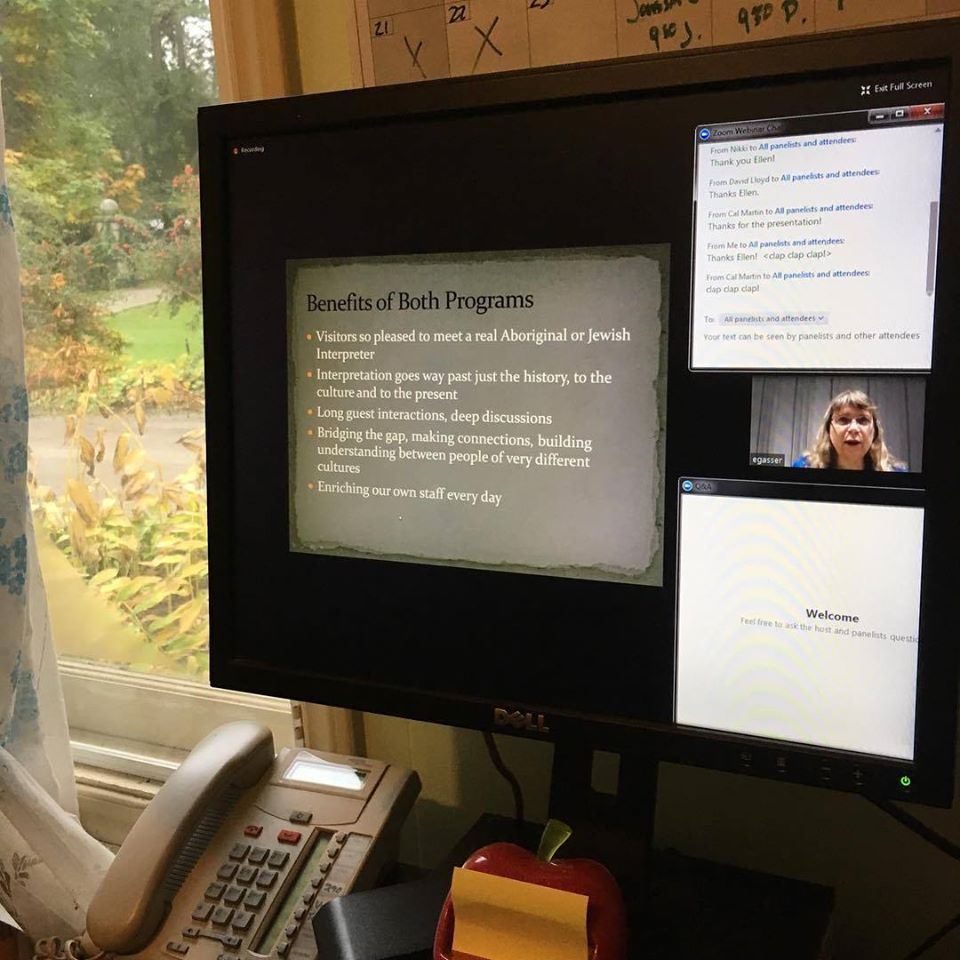by Pam Murray
Have you ever been really excited about something that nobody else was doing, only to see it all of a sudden become mainstream?
At Interpretation Canada, we’re excited to see something we’ve been doing for the past 11 years, online conferences, suddenly become incredibly popular. Our upcoming national conference, “This Time It’s Personal: Rethinking Non Personal Interpretation” is the eighth conference we have offered online since 2009. With 2020 appearing to be the Year of the Online Conference, we thought we’d share some of what we’ve learned over the past decade of organizing conferences online.

Interpretation Canada has been offering conferences from the comfort of your office since 2009.
In 2009, our board initiated a strategic planning process, and through that process identified that our members wanted more online content. Our membership was, and still is, geographically spread out across Canada. Travelling to in-person conferences is difficult for many of us, even when there isn’t a pandemic going on, due to costs and the need to get approval from our employers. We also had many members at that time voicing concerns about the carbon footprint of an in-person conference, especially related to the air travel required for people to attend.
As part of our 2009 Strategic Plan, we decided to try running our conference online for the first time. “Inspiration Uploaded” took place in December of 2009. We continued with this model until 2013, when we switched to alternating online and in-person national conferences. In the past decade, we’ve learned a few things about running conferences online. Here are our top five:
1) Pick your provider carefully. We’ve worked with two different platforms, and while both had strengths, we changed to our current platform because they are readily available for administrative support, which wasn’t the case with our previous provider. Online conferences require a lot of work behind the scenes, so finding a provider that isn’t just easy to work with but also genuinely excited about your business is important. When choosing a provider, it’s also important to know that some government organizations may have rules about which online platforms their staff are allowed to connect to. We currently use FieldTripZoom, because it’s a platform built specifically for online education.
2) Registration management is different online. At an in-person conference, it’s straightforward. Everyone registers individually, gets their own name badge and attends as themselves. In person, you’ll notice if someone shows up wearing someone else’s name badge, or brings all their non-registered coworkers along with them to a session. You can’t see those things happening in an online format.
Our initial approach was to create a ‘Site” registration. This was to be used in cases where several people would gather in one place to share a screen. This meant we only had to pay for one hookup to reach multiple people, and let us keep the conference affordable to our members. However, it also made it difficult to know exactly who and how many people were actually attending. It was also on the honour system. The site registration DID cost more, but we really had no way of knowing that people weren’t registering as individuals and sharing their screen with others. We’ve since changed to offering discounted registrations for additional participants at the same site, so that we know exactly who is attending.
3) Consider time zones. Offering an online conference in Canada means you really only have four or five hours of the day available. Interpreters in British Columbia don’t want to attend, much less present conference sessions earlier than 8am Pacific, and interpreters in Atlantic Canada want to go home at their regular 4 or 5pm Atlantic quitting time, so it’s best to fit all of your content into those constraints while also allowing for breaks. This means you may not be able to fit as many sessions in each day. This hasn’t been a huge issue in our experience; it has just meant we focus on quality of presenters rather than quantity.
4) Networking opportunities are important. When we first started, it was really important to us to pick a platform that didn’t just allow people to ask the presenters questions, but also to interact and chat with each other. At an online IC conference, we see participants greeting each other, noticing colleagues and friends in the chat, and interacting not just with the presenter but with each other. This networking is a very important part of in person conferences, and it’s essential to find a way to include this in an online conference as well.
5) Online conferences aren’t a substitute for in-person conferences - and vice versa. While it seems the current trend is to take conferences that were originally planned to take place in person and turn them into an online format, the reality is that they aren’t the same type of experience. Both formats have strengths and weaknesses. Online conferences are less expensive, less onerous to organize, more environmentally friendly, allow for recording and playback of sessions, and offer participants a great deal of flexibility in how they attend. Online conferences have also allowed us to welcome well known keynote speakers from outside of Canada, like Colleen Dilenschneider and John Falk, as speaker fees are generally much more affordable when travel isn’t involved. In-person conferences are more expensive, more difficult to organize, more of a commitment for people to attend, and don’t easily allow for recording and playback of sessions. They do, however, offer far superior opportunities to network, get to know colleagues, and take part in the visitor experiences offered by our host sites first hand.
We don’t want to give all of secrets away, but hope this helps those of you who may be considering running a conference online. Ours will be on September 22 – 24, and we’d love to see you all there.
Pam Murray is the Chairperson of Interpretation Canada, and has attended, presented at, and helped organize IC's online conferences since 2011.